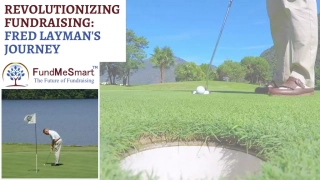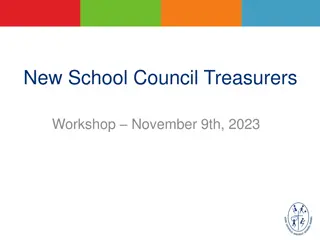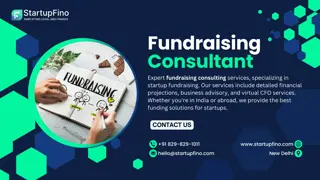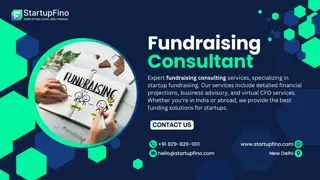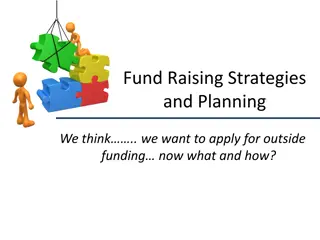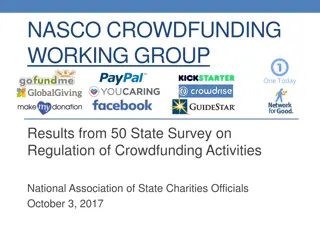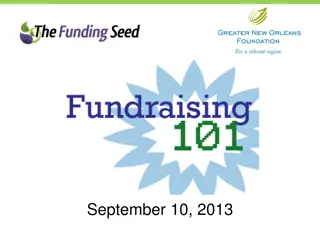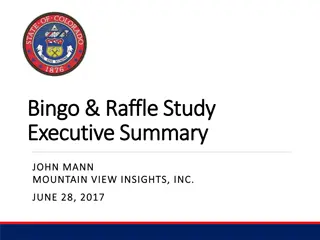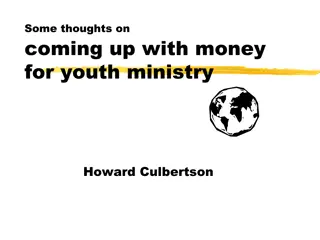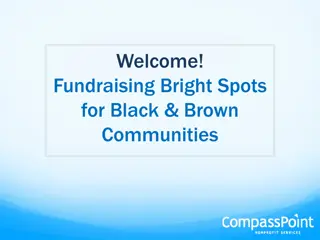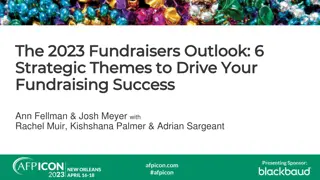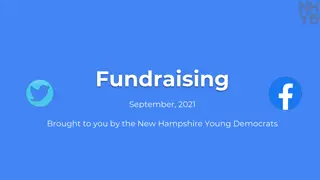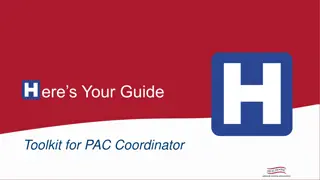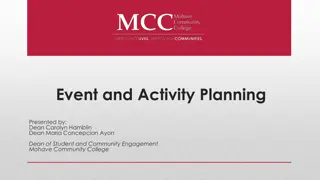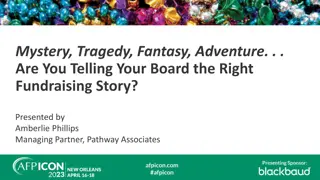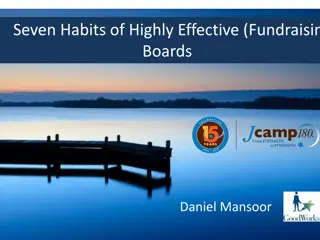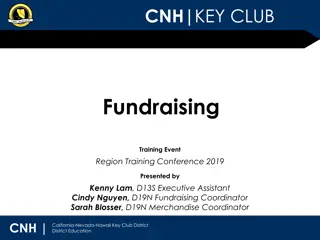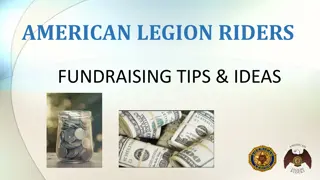Mastering the Art of Fundraising: Key Principles and Practices
Delve into the essential aspects of fundraising with a focus on defining philanthropy, understanding core fundraising areas, assessing knowledge strengths and gaps, learning key fundraising rules, and exploring additional fundraising resources. Discover the significance of current and prospective donor research, securing gifts, relationship-building, leadership, volunteer involvement, ethics, and accountability in successful fundraising endeavors.
Download Presentation

Please find below an Image/Link to download the presentation.
The content on the website is provided AS IS for your information and personal use only. It may not be sold, licensed, or shared on other websites without obtaining consent from the author. Download presentation by click this link. If you encounter any issues during the download, it is possible that the publisher has removed the file from their server.
E N D
Presentation Transcript
The Fundamentals of Fundraising Being a world class fundraiser
Learning Objectives Define philanthropy and fundraising Understand the 6 core areas of fundraising practice Identify your knowledge strengths and deficits. This helps to plan your professional development priorities Consider 10 fundraising rules Review list of additional fundraising sources & resources
Fundraising & Philanthropy Philanthropy is Love of humankind Voluntary action for the common good Driven by values and commitment Fundraising is the vehicle that facilitates or drives philanthropy
The 6 Core Areas of Fundraising Current & Prospective Donor Research Securing the Gift Relationship Building Leadership & Management Volunteer Involvement Ethics & Accountability
1. Current & Prospective Donor Research Task Summary Develop a list of prospective donors Implement & utilize a data management system List analysis Rating to prioritize and plan Presentation of prospect information to guide action
1. Current & Prospective Donor Research Knowledge Needed Constituency and gift potential indicators Donor acquisition strategies Data gathering and analysis techniques Prospect information sources and uses Prospect screening, qualifying and rating skills Privacy and ethical use of data
Example: Prospect Qualification LAI Linkage Ability Interest
2. Securing the Gift Task Summary Develop a compelling case for support Apply prospect research data to develop a plan Plan a comprehensive solicitation program Prepare appropriate solicitation communications Ask for and secure gifts of support Program evaluation
2. Securing the Gift Knowledge needed Donor motivation Components of a case for support Fundraising techniques and solicitation strategies Types of gifts (cash, in-kind, property) Fundraising program evaluation Use and application or prospect research Communication and negotiation methods
Example: The Fundraising Case for Support 1. 2. 3. 4. 5. 6. 7. 8. 9. 10. Future organizational plans The problem (or opportunity) to be addressed Trends affecting the problem (or opportunity) Your response to the problem (or opportunity) Role of the prospective donor Your mission Your history and track record Goals, strategy and objectives Organizational resources Accountability and evaluation (Joyaux, 2001)
3. Relationship Building Task Summary Initiate and strengthen relationships Comprehensive communications plan to inform Promote a culture of philanthropy Gift acknowledgement and recognition
3. Relationship Building Knowledge needed Cultivation strategies Communications planning and techniques Principles of donor acquisition and retention Interpersonal skills Donor recognition methods
Example: The 5 I s 1. Identification 2. Information 3. Interest 4. Involvement 5. Investment
4. Leadership & Management Task summary Culture of philanthropy across organization Sound administrative and management procedures Planning strategic plan integration, fundraising planning and budgeting Program performance evaluation and analysis Recruit, train and support fundraising staff
4. Leadership & Management Knowledge needed Mission and vision statements Strategic and fundraising program planning Program evaluation methods and standards Budgeting and financial management Policy development Human resource management Effective leadership
Example: What gets measured gets done Common program evaluation measures: Financial Gross and net revenue Response/renewal/retention rates Average gift size, year-over-year growth Cost of fundraising, fundraising ratios, return on investment Non Financial Participation rates, including % of giving by board, volunteers, staff Number of new donors, number of donor visits, responses from donor surveys
5. Volunteer Involvement Task summary Create a process to recruit, train and support volunteers Engage volunteers in fundraising Diversity in leadership
5. Volunteer Involvement Knowledge needed Volunteer roles in fundraising Volunteer recruitment, training and management Principles of adult learning Non profit governance
Question: Why involve volunteers in fundraising? 1. Expands organization s reach and network 2. Enhances credibility 3. Creates ambassadors for you cause 4. Builds community 5. Volunteers are often the best donors
6. Ethics & Accountability Task summary Ensure all fundraising activities are conducted ethically Gift acceptance policies Donor intent and instructions Reporting back to constituencies Comply with all reporting and regulatory requirements
6. Ethics & Accountability Knowledge needed Regional laws and regulations Legal and ethical practice Gift acceptance and acknowledgement procedures Accounting principles Financial reporting standards Privacy and information protection Ethical standards and decision making
Ethics Case Study: A donor gives your organization a gift to purchase 10 new computers for the new Resource Centre. You later discover there is only space for 8 new computers. You: 1. Buy 8 computers and redirect the saved funds to buy books. Buy 10 computers and keep 2 in storage. Explain the situation to the donor and ask if the balance of the funds can be redirected to another purpose. 2. 3.
When love and skill work together, expect a masterpiece. John Ruskin
10 Fundraising Rules to Live By 1. Make your own leadership gift first. It shows your commitment and gives you a donor perspective. Use the rules of courtship to get closer to your donors and prospective donors. Don t forget the donor after you get the gift! Say thank you A LOT and show it in many different ways. Maximize organizational relationships (cash, in- kind, volunteers, dual/triple asks) Invest in your fundraising program for long term results 2. 3. 4. 5.
10 Rules contd 6. Stay true to your mission, don t get sidetracked to appease a donor or secure a gift. Know you can t do everything. Start small and do it well, measure & evaluate, manage growth strategically. Work joyfully. Believe you are changing the world! If you are not, ask yourself why not? Is it time for a new job? Asking is not begging. It is an honorable act that has the power to change the giver and receiver. 7. 8. 9. 10.
Additional Sources and Resources
Great information available here . Kenya Association of Fundraising Professionals. www.kenyafundraising.org Southern Africa Institute of Fundraising. www.saifundraising.org.za CFRE International. www.cfre.org The only international credential for professional fundraisers, setting professional standards of practice & accountability. Association of Fundraising Professionals. www.afpnet.org Online training resources, Donor Bill of Rights, Code of Ethical Principles & Standards of Professional Practice.
The Resource Alliance. www.resource-alliance.org A member-based UK organization that builds fundraising capability worldwide. Saint Mary s University, Philanthropy & Development graduate program. www.smumn.edu Simone Joyaux. www.simonejoyaux.com Website is rich with resources, tips and research as well as an extensive bibliography. Wiley/Jossey Bass. www.wiley.com Largest publisher and distributor of fundraising/charitable literature.
Charity Village. www.charityvillage.com The Chronicle of Philanthropy. www.philanthropy.com E-Philanthropy Foundation. www.e-philanthropy.net Indiana University, Center on Philanthropy. www.philanthropy.iupui.edu Academic programs, emerging research Harambee Centre, Moi University www.Thefundraisingsite.co.za
Sharilyn Hale, M.A., CFRE Toronto Canada sdhale@rogers.com KAFP Mombasa Kenya December 2010




